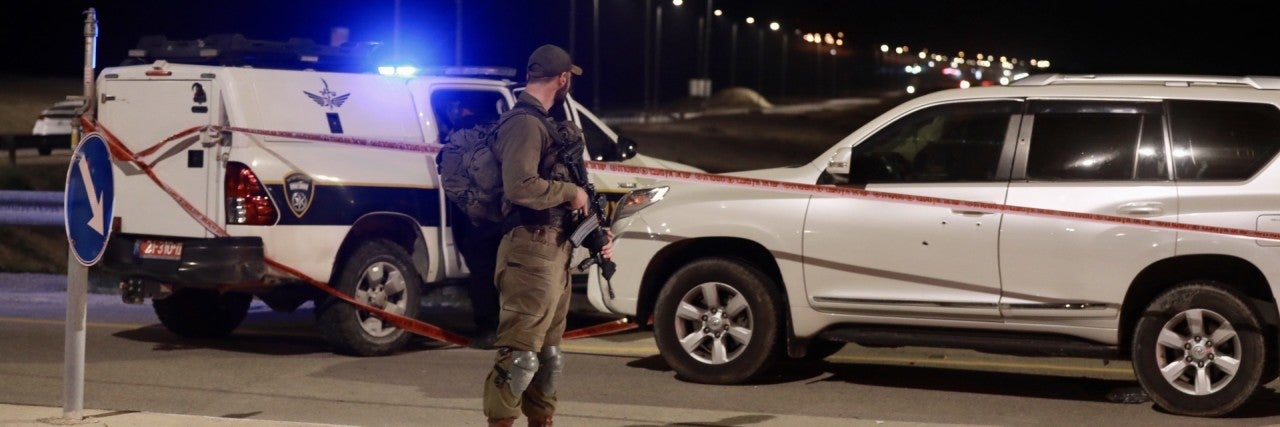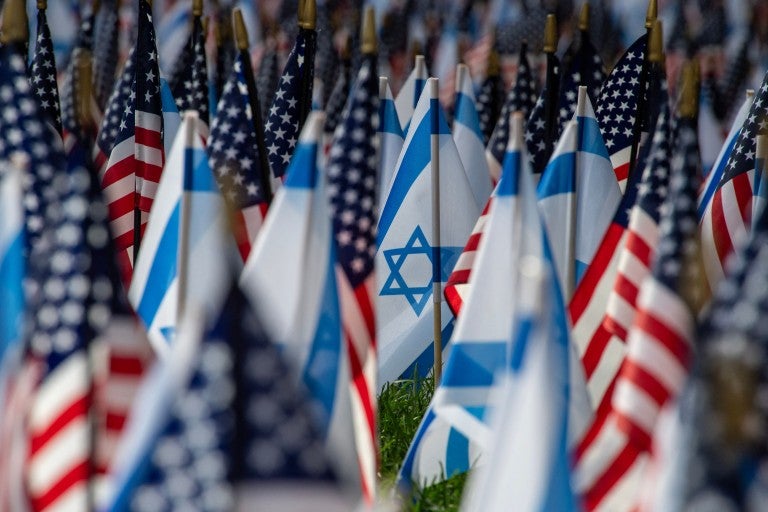August 21, 2023
So far 2023 has been a particularly volatile period between Israelis and Palestinians. Tragically, 34 Israelis have been murdered so far this year by Palestinian terrorists – surpassing the total killed in terror attacks in all of 2022. In late February, violent riots by Jewish extremists seeking vigilante justice – especially in the West Bank town of Huwara – further inflamed tensions between Israelis and Palestinians. And more recently, the Israeli police action at the al-Aqsa Mosque on the Temple Mount, rocket attacks from Lebanon and the Gaza Strip, and terror attacks in Tel Aviv and the West Bank have led to fears of wide-scale violence. In order to engage constructively for the welfare of Israelis, as well as Palestinian civilians, it is important to understand what’s happening.
Here’s what you need to know about the ongoing wave of terrorism, tensions over the Temple Mount, and the overall security situation in the West Bank:
When did this wave of terrorist attacks in Israel begin?
Over the past year, Israel has experienced one of its deadliest periods of terrorist violence in Israel since the Second Intifada in the early 2000s. This year’s spike in Israeli fatalities from terror attacks came after a deadly toll of 33 Israelis murdered in such attacks in 2022. In late January, a terrorist murdered seven Israeli worshippers after Sabbath prayers at a Jerusalem synagogue. On February 26, two Israeli brothers were fatally shot by a Palestinian man in the town of Huwara, south of Nablus. The very next day, on February 27, an Israeli-American was murdered outside of Jericho while on his way to a wedding. On March 9, a terrorist affiliated with Hamas opened fire at people at a cafe in Tel Aviv, wounding at least three.
This terror wave continued into the spring as Israelis celebrated Passover. On April 7, a car rammed into a group of tourists in Tel Aviv, killing an Italian citizen and wounding five others. On the same day, two Israeli-British sisters, Rina, 16, and Maia Dee, 20, were killed in a shooting attack on the car they were riding in with their mother Leah in the Hamra Junction area in the northern West Bank. Ahead of Yom HaZikaron, Israel’s Remembrance Day for fallen soldiers and victims of terror attacks, a terrorist rammed his vehicle into the crowded Mahane Yehuda marketing in Jerusalem, injuring at least five people, including one seriously.
The terror violence has not abated entering the summer months. On June 20, four Israelis were shot dead, and several others injured, at a gas station near the West Bank settlement of Eli, according to the Israel Defense Forces. The Israeli victims were Nachman Mordoff and Elisha Anteman, both 17, as well as 21-year-old Harel Masood and 64-year-old Ofer Fayerman. One of the terrorists was shot dead at the scene by an armed Israeli civilian, while the other was killed later by Israeli security forces. Both gunmen were affiliated with Hamas.
On August 1, six Israelis were shot and wounded, one of them seriously, in a terror attack at a shopping center in the settlement of Ma'ale Adumim. The Palestinian terrorist who carried out the attack was shot dead by an off-duty police officer.
Tragically the terror attacks have continued throughout August. On August 21, an Israeli woman was shot dead and an Israeli man was seriously injured in a shooting attack near the West Bank city of Hebron. Just days earlier, an Israeli father and his son were shot dead in the West Bank town of Huwara. The father and son were waiting at a car wash when the deadly attack occurred.
Speaking from the scene of the attack near Hebron, Israeli Prime Minister Benjamin Netanyahu said that Iran was directing the ongoing terror wave.
“We are in the midst of a terrorist onslaught that is being encouraged, directed, and financed by Iran and its proxies,” Netanyahu said.
What is the security situation in the West Bank?
Over the last decade, the Palestinian Authority (PA) has increasingly lost control of the security situation in much of the West Bank amid the Palestinian population’s widespread discontent with the PA and its leader Mahmoud Abbas. As confidence in the PA has declined, terrorist groups including Hamas, Palestinian Islamic Jihad, and the Lion’s Den have stepped up their efforts to gain influence within the West Bank.
Terror attacks on Israelis are occurring more frequently, with many assaults originating in northern West Bank cities, such as Jenin and Nablus.
In a bid to de-escalate, Israeli and Palestinian officials held a rare meeting in Aqaba, Jordan, on February 26, in which both sides agreed on steps to reduce tensions in the West Bank and Jerusalem.
However, that meeting appears to have not led to a significant de-escalation. Following the most recent deadly attacks in early April, Israeli Prime Minister Benjamin Netanyahu called up reserve forces in Israel’s Border Police to “confront the terror attacks.”
Tensions between Israel and Palestinian terror groups have not been limited to the West Bank. In May, the IDF launched Operation Shield and Arrow targeting Palestinian Islamic Jihad targets in Gaza after the terror group fired over 100 rockets at Israel earlier in the month.
Israeli security forces have focused on the terror threat from Jenin that has been ongoing for over a year, with part of this activity meant to thwart attempts to manufacture rockets in the West Bank. An Israeli counter-terror security activity on June 19, left five Palestinians dead, with at least three of the dead belonging to Palestinian Islamic Jihad.
Visiting wounded soldiers, Netanyahu said that Israel has in recent months “eliminated and arrested a record number of terrorists, and this was the case in the Jenin operation as well.”
On June 21, an Israeli drone struck a vehicle carrying Palestinian gunmen who had opened fire at a checkpoint in the northern West Bank. The IDF said that the cell had been responsible for a number of recent shooting attacks in the area.
What is Israel doing to prevent terror attacks?
Israeli security forces have been conducting near-daily counterterrorism activities throughout the West Bank. This is in large part due to the declining effectiveness of the Palestinian Authority security forces and their inability to maintain security. While these security activities, which began during the terror wave that started in the spring of 2022, have focused on neutralizing terror cells in the area and preventing further and sometimes imminent attacks, they have also led to a small number of unintentional deaths among Palestinian civilians caught in the crossfire.
Israel’s counterterrorism activities are done with precision to minimize Palestinian civilian casualties. While indiscriminate terror attacks targeting Israelis seek to cause as much destruction and loss of life as possible, through wide-scale attacks such as rocket fire at Israeli towns and cities, as well as knifing, suicide bombing, car-ramming, and shooting, such as the recent assaults in Jerusalem.
On July 3, Israel launched a major operation in the Jenin refugee camp to neutralize ongoing terror threats in the region. Over 1,000 Israeli soldiers were involved in the operation, the largest in the West Bank since the Second Intifada in the early 2000s. Click here to read more about this Israeli operation and the role Iran plays in supporting Palestinian terrorism.
What about Jewish riots in the West Bank?
Following the murder by a Palestinian terrorist of two Israeli brothers – Hillel Yaniv, 22, and Yagel Yaniv, 20 – on February 26 along a road in the West Bank town of Huwara, a mob of dozens of Jews took part in violent riots in Huwara, with some setting fire to property and provoking clashes with the local Arab community.
During these riots, a Palestinian was killed after being shot in the stomach. Dozens more were wounded.
Similarly, following the deaths of four Israelis in a terror attack on June 20, Jewish vigilantes rioted in several Palestinian towns in the northern West Bank that evening, torching cars and fields. Further riots occurred near Ramallah the following day as well after the funerals of the four Israelis who were murdered.
What has been the response to these riots?
Israeli President Isaac Herzog stated: “Taking the law into one’s own hands, rioting and committing violence against innocents—this is not our way, and I express my forceful condemnation.” AJC joined President Herzog in condemning the violence.
Israeli Prime Minister Benjamin Netanyahu also said that “I ask—even when the blood is boiling—not to take the law into one’s hands.”
Netanyahu added, “Let the IDF complete its pursuit and do not take the law into your hands; together we will defeat terrorism.”
Further, AJC condemned Israeli Minister of Finance Bezalel Smotrich for encouraging Jewish violence in Huwara.
Military chief Herzi Halevi said "The grave events of lawlessness in Huwara after the severe attack will be thoroughly investigated."
On March 7, Israel Defense Forces carried out security activity in Jenin in the West Bank, where at least six terrorists were killed, including a Hamas member suspected of murdering the two Israeli brothers on February 26.
AJC also condemned the June 20 violence on Palestinians by Israelis in the West Bank.
We condemn the violent attack on Palestinians by Israelis in the West Bank.
— American Jewish Committee (@AJCGlobal) June 21, 2023
We stand firmly with Israeli authorities in their efforts to identify and prosecute those responsible for this violence. https://t.co/i6EC8hoje2
What happened on the Temple Mount?
In early April, as Jews celebrated Passover and Muslims marked Ramadan, tensions flared on the Temple Mount amid an Israeli police operation to remove a group of Palestinians who had stockpiled rocks, cudgels, and improvised explosives, allegedly for use against Jewish visitors to the site and had been reportedly planned weeks in advance by the rioters.
The police action sparked international condemnation, especially among Muslims, and was used as justification by terror groups to carry out terror and rocket attacks against Israel, including nearly three dozen rockets that were fired by terror groups in Lebanon and the Gaza Strip.


